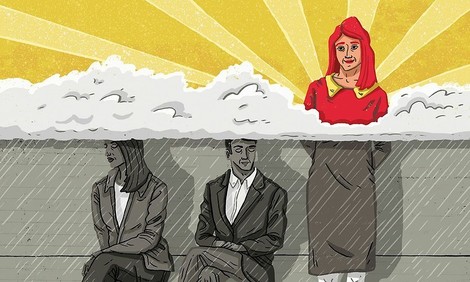Your podcast discovery platform
Curious minds select the most fascinating podcasts from around the world. Discover hand-piqd audio recommendations on your favorite topics.

piqer for: Global finds Doing Good
Michaela Haas, PhD, is the award-winning author of four non-fiction books, most recently Bouncing Forward: The Art and Science of Cultivating Resilience (Simon&Schuster). She is a member of the Solutions Journalism Network and writes a weekly solutions column for the German Süddeutsche Zeitung Magazin. Her articles have been published on CBS, the Washington Post, the Huffington Post, Daily Beast, and many other reputable media.
"You Can Always Recover": The Science of Posttraumatic Growth
My heart skipped a beat when I read that Christine Blasey Ford, who testified so bravely in front of the US Senate, had taken a special interest in researching resilience and posttraumatic growth. She tried to make sense of what happened to her and find strength. The Washington Post feature says:
She took a particular interest in resilience and post-traumatic growth — the ideas that people who endure trauma can return to normal and even wind up stronger than before. Ford said she has given speeches about this topic to students, telling them, “You can always recover.”
When she testified about her memory of an attempted rape by Supreme Court nominee Brett Kavanaugh, her resilience was tested.
Therefore I wanted to share this article about posttraumatic growth, what it is, and how it can be developed.
The most important factor in developing posttraumatic growth is support. It seems that Dr. Ford found support from her family, her therapist, and her peers, but it was also encouraging to see thousands of women take to the internet and the streets to voice their support. #IBelieveYou was written on many signs.
But before and during her testimony, we also saw the worst of reactions. The attacks on her, death threats, and attempts to smear her reputation are exactly the reasons why women don't come forward.
"The way we treat survivors is unacceptable", Senator Cory Booker said during the hearing. So let's remember how important it is to be their ally.
“Nobody ever does it alone,” civil rights icon Maya Angelou recognized, years after being raped at the age of 8. Resilience is always a team effort. Moving forward after a crisis depends not only on the individual’s resources and their genetic makeup or upbringing, but also on their connections to the people around them and the quality of support. The best kind of support encourages survivors to focus on their strength but doesn’t gloss over their wounds. Nothing is as powerful as knowing we are not alone.
